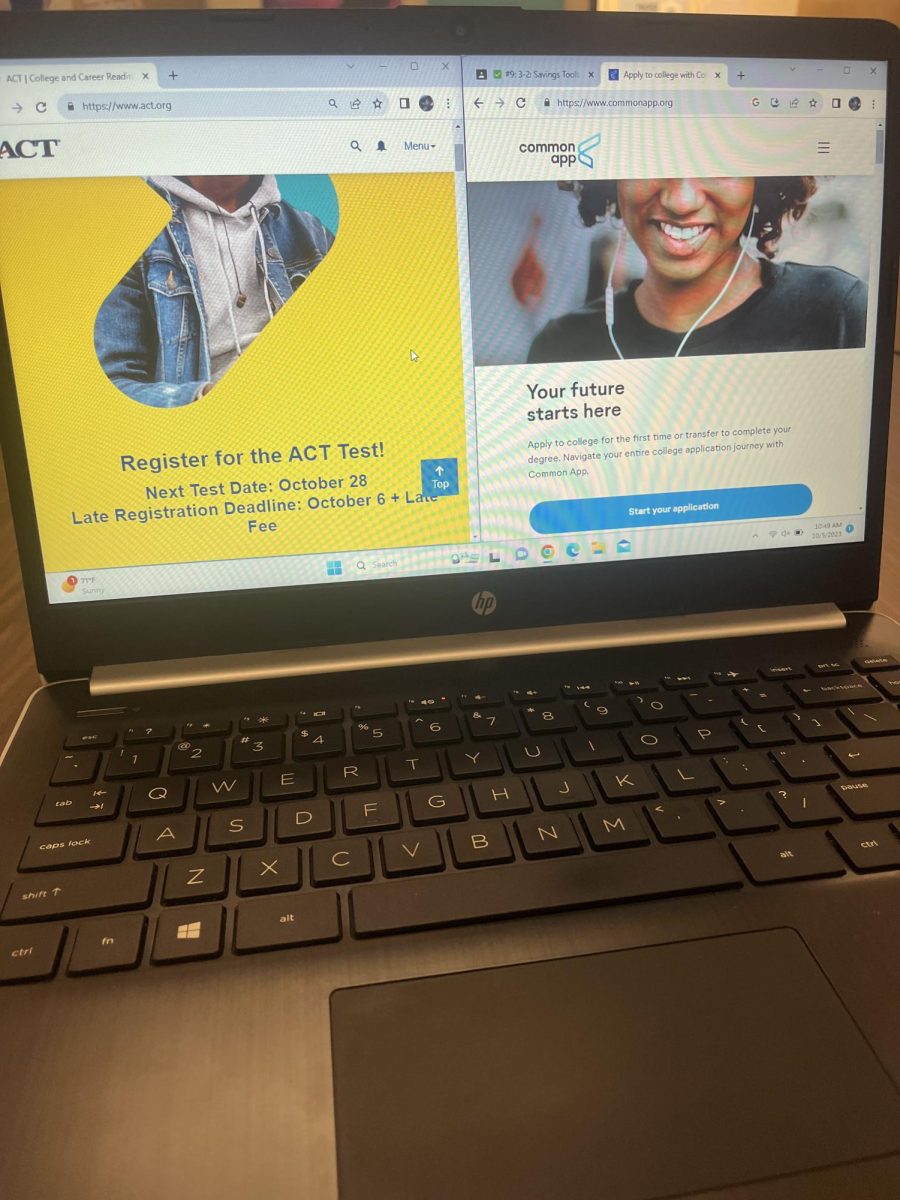Test-optional policies give students the best of both worlds when it comes to college admission.
Owen Stoltz
It is one of the parts of high school that students dread the most, and up until a few years ago, one of the most important in determining college acceptance.
The subject is standardized testing.
Whether it be the ACT or SAT, many high school students will take a standardized test before graduating. From the class of 2022, the ACT had 1.3 million test takers, an estimated 36% of total graduates, with 35% of those test takers taking the test more than once. Roughly 1.7 million students from the same graduating class took the SAT.
In spite of the popularity of these tests, many colleges are choosing to move away from them.
Nearly 2000 colleges and universities across the United States are now test-optional, including many top institutions such as Harvard, Yale, Columbia and the University of Pennsylvania.
Although gaining traction for many years dating back to the 1960s, the test-optional movement took off during the Covid-19 pandemic, when lockdowns canceled tests and caused limited testing dates to fill up quickly.
With many students not having access to standardized testing, schools were forced to remove test score submissions from application requirements and instead make them optional or not allow their submission at all.
Test-optional policies and test-free policies have two very different approaches, and the advantages and disadvantages of each are very different. The first route that schools have taken is test-free policies.
These policies take more of a generalized approach by grouping all students into the same pool. They do not allow score submission at all. Students who did not perform well on standardized tests or didn’t take them at all have the same chance of getting admitted as students who put the time in to get a good score.
These policies are not the right way to go.
While some argue that standardized tests are not a good measure of student ability, they very much are. From the day they step foot into college until the day they retire, students will be tested and put under pressure to perform, both in their education and their job, something that a standardized test measures well.
St. Ambrose University psychology professor and Department Chair Julie Kettmann explained some of the consequences that colleges face with not having test scores. “A main disadvantage I see with being test-optional is that colleges don’t have great course level placement data anymore. Previously ACT subtest scores for example could be used to help determine the appropriate level of math or English for a new student. Now, college advisors have to guess a little more or rely solely on high school grades, which can be inflated,” she stated.
This problem is especially present in test-free schools, and while it cannot be totally eliminated, a truly test-optional system mitigates the effects.
Schools that are test-optional allow students who are submitting scores to have those scores considered, and those not submitting scores to have no penalty for not doing so. The students who submitted the scores do not have an advantage on paper over those who did not, but if a student feels like their score might help them get admitted, they can submit it.
Kettmann went further in explaining how even at test-optional schools, tests could still be a deciding factor in admission. “It seems reasonable to think for universities with highly competitive applicant pools, the more favorable data you can give on your application, the better,” she inferred.
True test-optional policies would encourage students to submit scores in competitive applications, while still giving an opportunity to those who felt like the score was not a good representation of their academic ability.
Senior Max Sorgenfrey plans to attend a four-year university, but doesn’t plan on submitting test scores. He believes that test-optional policies are very beneficial. “I think the increasing number of colleges going test-optional is a good thing. With the positives, it allowed kids who aren’t good at tests to still get into desired universities,” he described.
Previously, if a student did not do as well on their standardized test as they expected, they would be submitting a score that does not represent them well. Now, students could opt to not submit scores and be compared against others who did the same based on additional factors like GPA, extracurricular activities and volunteering.
Whether colleges continue to move towards the test-optional or test-free direction after all of the effects of the pandemic are gone is yet to be determined. However, if they do, not punishing students who submitted scores, while also not punishing those who did not, gives applicants the best of both worlds and allows for the best pool of future college attendants to be selected.
ACT scores: The college requirement that should have never gone away
Tyler Nels
Students go to school for 6 hours, then some have practice for 2, then homework and with whatever minutes remain, they find themselves tackling one of the dozens of 500 word essays required for college scholarships.
Why? Because the non-test holistic view takes thousands of words to explain, even for those who submit an ACT for the school to review. Wouldn’t it benefit students more physically and mentally to bring back the ACT requirement and do away with some of the massive essays?
The ACT was removed because of lack of access to testing centers during COVID. That is longer an issue.
Nothing is hindering students from taking the ACT; those that have chosen to are still getting exceptional scores.
The marks students are hitting show their resilience while learning during COVID, and after the removal of affirmative action, allows students to separate themselves from the rest of the crowd. Pleasant Valley senior Nathan Musal is one of those standout students. “The ACT is the same for everyone throughout the country and allows direct comparisons in a way that is otherwise not possible,” he said. “I hope that my ACT score will help me maximize the potential of my college application.”
Those who are socioeconomically disadvantaged also benefit from a test requirement.
In some schools, students are unable to gain access to advanced courses at their schools or are unable to afford outside opportunities that would give them an edge on other applicants. However, students are able to self-study topics found on the ACT due to study materials being readily available online. This gives students of a low socioeconomic status the opportunity to shine through standardized tests, even if other areas of their application don’t show their true prowess.
Standardized testing is more than just a score; it shows how well a student works under pressure.
Pleasant Valley senior Achinteya Jayaram understands the importance of submitting his test score. “When you submit your ACT or SAT record you are showing that you have what it takes to sit down and prepare for standardized tests, and in college you are going to take tests that are, more often than not, the same length and difficulty,” he said.
Another reason colleges, specifically highly-selective schools, should reinstate the ACT requirement is to weed out weaker candidates.
This is why some schools, like MIT, have already made the ACT a required part of their admissions process. “The people who go to MIT are the top of the class, so they want to keep the standard of people at the top of their class to keep coming to their school. The ACT requirement creates a barrier for entrance at those schools,” stated Jayaram. The standardized tests create more certainty for schools that applicants will succeed in advanced courses.
Every student is trying to stand out, so why not have another way for applicants to show what they know? The hours spent trying to help a university understand how hard one works through essays could easily be replaced with a one-day, four-hour test. The test doesn’t leave one thinking, “Did I use the correct verb? Did I describe myself in a way they will understand? Did I give enough?”
Many universities offer automatic merit scholarships based on GPA and ACT scores. For example, the University of Iowa spells out the money breakdown on their website, which states “Merit-based scholarship eligibility will only consider standardized test scores.” If they are so willing to entice high-achieving students with money, it would make sense that they attract a student body using the same tactics.











